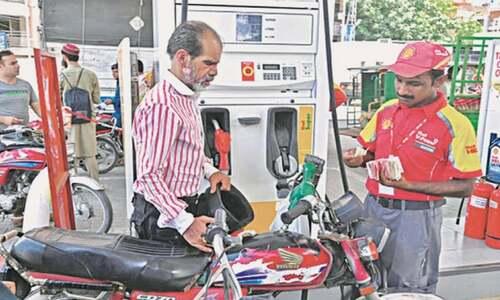 |
| A K-Electric power plant. A sentiment booster for the company’s stock appears to be an agreement it has inked with Bahria Town to set up a coal-fired plant of 330MW and an LNG-powered generation plant of 200MW within a period of three to four years, which would boost its future earnings. |
K-Electric took the market by surprise last week when the daily turnover of its shares accounted for over 10pc of the aggregate market volume, making it the top-traded scrip on the stock market for five straight sessions.
No one could fathom the reason for investors’ interest in K-Electric Ltd (KE), which still ranks among the ‘third-tier’ stocks as its price trades at a discount to its par value. Yet, the market was rife with rumours that the controlling equity in the company was about to change hands.
Replying to a query by the Securities and Exchange Commission of Pakistan, KE’s finance director Muhammad Rizwan Dalia said in a notice sent to the KSE that “KES Power Limited (KESP) and the government collectively hold 90.76pc shareholding of KE and we have not been informed about any transaction in the company’s share by any of the two major shareholders”.
Yet, two events could have triggered investors’ interest in the utility. First, KE’s Sukuk issue of Rs22bn on May 29 was fully subscribed. And second, the company posted its financial results for the first nine months of the fiscal (9MFY15) on April 23, in which it recorded a net profit of Rs16.3bn, up 1.6 times over earnings of Rs6.3bn in the corresponding period of the previous year. This corresponded with earnings-per-share of Re0.59, up from Re0.23 last year.
Analysts say the proceeds from the Sukuk issue would help refinance the company’s debts, with around Rs18bn payable to senior lenders including the IFC and the ADB
Analysts say the proceeds from the Sukuk issue would help refinance the company’s debts, with around Rs18bn payable to senior lenders including the International Finance Corporation and the Asian Development Bank.
“The Sukuk will also benefit K-Electric in devising a strategy for capacity additions and other measures regarding improving efficiency of the company,” said analysts at Aba Ali Habib Securities.
And analysts at AKD Securities also believed that the receipts from the Sukuk would reduce the company’s weighted average cost of debt to 10.8pc. “We see this as a pertinent catalyst for earnings growth, free cash flow generation and capital enhancement.”
KE claims to be the only vertically-integrated power utility in the country and manages the generation, transmission and distribution of electricity. It had remained in the red for 17 years until financial year 2012, when it managed to earn a net profit of Rs2.6bn.
For 9MFY15, the company’s net sales grew marginally to Rs139.4bn from Rs138.2bn. And while it still carries huge debts on its balance sheet, sector analysts have started to see light at the end of the tunnel.
Investment analyst Syed Atif Zafar commented in a report last week that the KE’s FY15 earnings could rise 92pc, with its eps clocking in at Re0.90. The earnings could grow at the compounded annual growth rate (CAGR) of 32pc on the back of a consistent decline in transmission and distribution losses, improving fleet efficiencies, lower international crude oil prices and the expected conversion of its 420MW plant to coal.
“We do not expect the 3pc super tax imposed in the federal budget by the government to impact KE, given that its bottom-line remains in the red without the government’s subsidy,” Zafar said, adding that it was a similar argument for the company not charging/paying the 17pc alternate corporate tax (ACT) or the 33pc corporate tax.
Following the utility’s privatisation on November 29, 2005, 73pc of its equity passed onto Al-Jomaih and NIG for $293m or Rs20bn. Currently, Abraaj and Al Jomaih/NIG together hold 66.36pc of the company’s shares through KES Power. Meanwhile, the government holds a 24.4pc stake in the company, with minority shareholding at 2.6pc.
The company has 27.6m outstanding shares and Rs27.6bn in paid-up capital. The market considers this to be too high, given that among the other six independent power producers (IPPs), the Hub Power Company comes closest with a capital of Rs1.15bn.
According to AKD Securities, the company’s market capitalisation works out at Rs205bn, and it had Rs306bn in assets at end-June 2014. The KE stock had touched a one-year high at Rs10.29 a share and a low at Rs6.11. The stock closed last Thursday at Rs8.84.
While the National Electric Power Regulatory Authority (Nepra) has approved the generation license for K-Energy, which would allow KE to convert 420MW to coal, the final tariff determination for the project is still being awaited. Some sector watchers expect it to come online by July 2017.
Meanwhile, another sentiment booster for the KE stock appears to be the agreement inked by the company with Bahria Town to set up a coal-fired plant of 330MW and an LNG-powered generation plant of 200MW within a period of three to four years.
“We believe the Bahria Town project can provide further upside to earnings because it would result in an around 30pc increase in power generation, and the line losses will also be limited due to the proximity of the plant with the housing scheme,” said a senior power sector analyst.
However, analysts at AKD Securities pointed out two potential dampeners: KE’s ongoing legal disputes with Nepra on certain calculations, with the disputed amount being Rs10.2bn, and the slide in its recovery ratio to 91.9pc in 9MFY15 from 93pc in 9MFY14.
Published in Dawn, Economic & Business, June 22nd, 2015
On a mobile phone? Get the Dawn Mobile App: Apple Store | Google Play











































